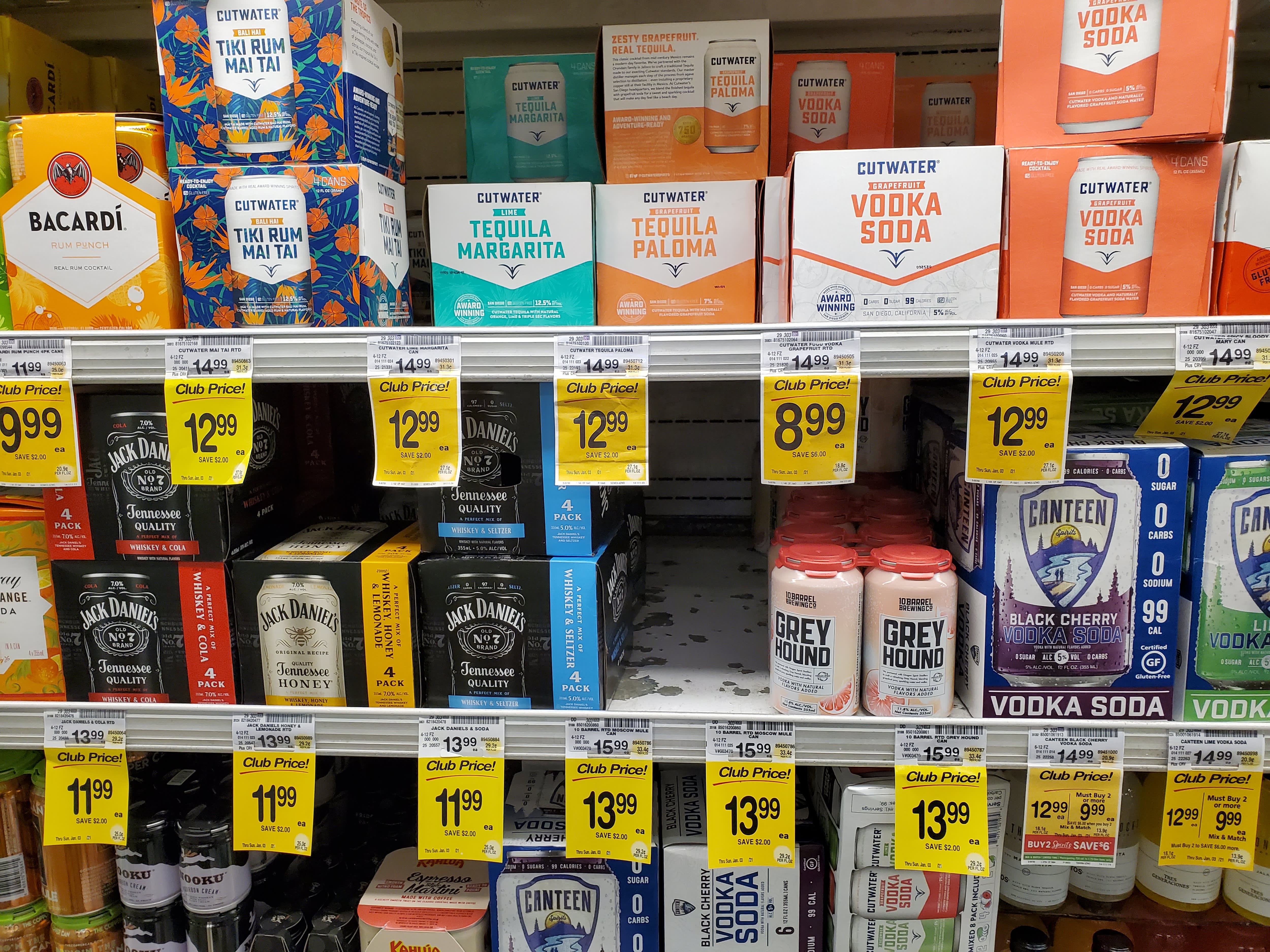This summer’s hottest cocktail comes in a can.
Between 2019 and 2020, the premixed cocktail category grew by 50% in the United States, according to industry tracker IWSR. The segment is still relatively small, accounting for only 3% of U.S. spirits volume, based on data from the Distilled Spirits Council of the United States. But companies and industry experts expect huge growth after its pandemic boom. Bank of America Securities is forecasting that the category will reach $3 billion to $4 billion in revenue over the next few years.
The rise of hard seltzer has fueled the growing popularity of canned cocktails. Ready-to-drink vodka sodas or gin and tonics appealed to consumers looking for a stronger taste or more alcoholic drink, and the category has expanded with greater variety.
Like hard seltzer, canned cocktails appeal to consumers who choose their alcoholic drinks based on convenience and taste. However, ready-to-drink cocktails are usually more premium because their base is made from real spirits, not the sugar or malt found in hard seltzer or lemonade. A six-pack of hard seltzers usually sets consumers back about $10, which is also the starting price for a four-pack of canned cocktails.
Canned cocktails can also be harder to find outside of liquor stores because states regulate them differently than flavored malt beverages.
In a March report to clients, Bank of America beverage analysts picked Anheuser-Busch InBev and Diageo as two companies that will emerge as key players. For now, some of the standout brands are E. & J. Gallo’s High Noon, Monaco, AB InBev’s Cutwater Spirits and Beam Suntory’s On the Rocks, according to analysts.
Alcohol giant AB InBev entered the segment in 2019 through its purchase of Cutwater, a San Diego-based craft distillery. Cutwater is the second-bestselling canned cocktail brand in dollar sales with a 10% share of the ready-to-drink cocktail space, based on IRI data from the 13 weeks ended May 9.
For the Budweiser brewer, the acquisition was a way to move into new categories as consumption of beer has been trending downward in recent years. Fabricio Zonzini, president of the company’s beyond beer unit, said that his division’s first priority is ready-to-drink beverages.
“I think that Covid was somewhat a propeller for ready to drink because it brought the convenience of the bar to your home,” he said. “And we saw that growth. Thank God we had Cutwater.”
Beyond Cutwater, AB InBev has also partnered with a Canadian distiller on Nutrl, a line of vodka drinks. Zonzini said that the company will test the beverages in the U.S. to appeal to consumers who want a more light and refreshing cocktail, similar to the flavor profile of a hard seltzer. Last year, the company released flavored vodka under its Natural Light brand, which could mean canned vodka cocktails from the brewer if the liquor sells well.
“If we see the results, if it connects the way that we believe, it opens up another door,” Zonzini said.
Johnnie Walker owner Diageo is making its own push into the segment now. In April, it bought Loyal 9, which mixes vodka and lemonade together in a can. Before the purchase, it had already launched canned cocktail offshoots of Crown Royal, Ketel One Botanical and Tanqueray.
“The category has been doing really well. It’s the fastest growing part of [total beverage alcohol] and is just accelerating fast,” said Jay Sethi, senior vice president Diageo’s North American convenience category.
Sethi said that consumers are starting to look for more premium canned cocktails, which means that they’re willing to spend more as well.
It’s not just the alcohol giants that are looking to gain from the growth of canned cocktails. Smaller upstarts like craft distillery Cardinal Spirits have put out versions as well.
Zing Zang, which has a cult following for its Bloody Mary mix, entered the alcoholic beverage market last year with its first line of canned cocktails. The move took several years as it perfected the recipes and found distributors that could easily transport alcohol, but the drinks are doing well so far, according to CEO Brent Albertson.
Albertson, who spent three decades at Diageo before joining Zing Zang, said that the company’s market research found that 25 to 37 year olds were the target market for the drinks.
“They’re not drinking it to get drunk,” Albertson said. “They want to do it on boats, on golf courses. They want that convenience and portability.”
Even as consumers flock back to their favorite bars, the canned cocktail trend isn’t expected to fade away. Brandy Rand, chief operating officer of the Americas at IWSR Drinks Market Analysis, said that she’s expecting more ready-to-drink beverages to show up on menus.
“Consumers like them and they also provide on-premise operators a profitable option when faced with capacity and staffing issues, tighter margins, and slimmer menus,” Rand said. “Canned cocktails are also a great option for drinks-to-go in states where legal.”
